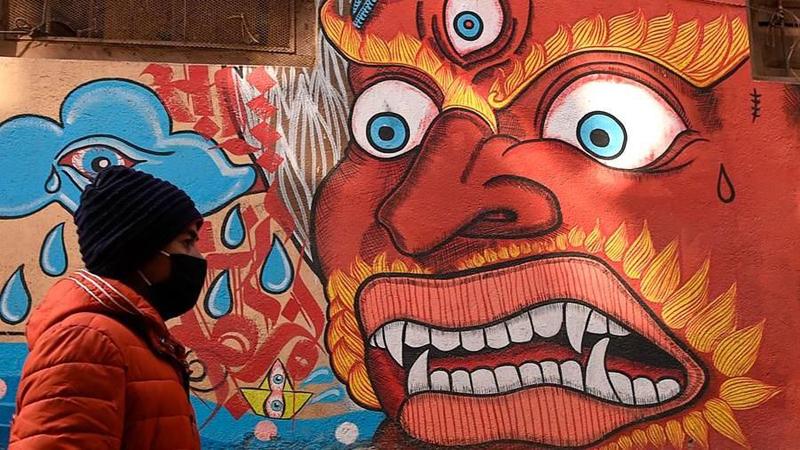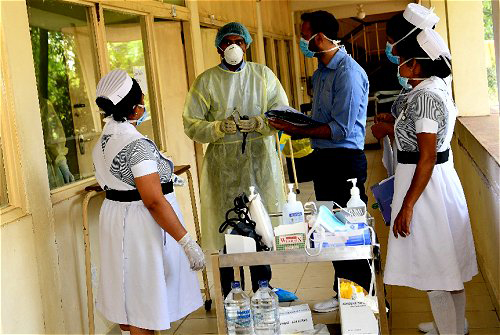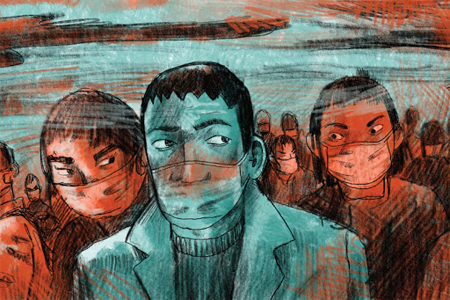
In the Ted-Talk Conference of 2015, Bill Gates made a speech that is closer to now than ever. It seems more like a prediction and a warning that Bill Gates gifted us seven years ago.
“When I was a kid, the disaster we worried about most was a nuclear war. That's why we had a barrel like this (showing it) down in our basement, filled with cans of food and water.
When the nuclear attack came, we were supposed to go downstairs, hunker down, and eat out of that barrel.
Today the greatest risk of global catastrophe doesn't look like this. Instead, it looks like this (showing the picture of coronavirus). If anything kills over 10 million people in the next few decades, it's most likely to be a highly infectious virus rather than a war. Not missiles, but microbes. Now, part of the reason for this is that we've invested a huge amount in nuclear deterrents. But we've actually invested very little in a system to stop an epidemic. We're not ready for the next epidemic.”
 Four months have passed since the official outbreak of the Covid-19, also known as Coronavirus, in China. Since then, it has spread all around the world.
Four months have passed since the official outbreak of the Covid-19, also known as Coronavirus, in China. Since then, it has spread all around the world.
It started in China, with a few cases of what seemed like pneumonia.
Chinese authorities reported on December 31 that 41 people in Wuhan, the most populous city in China, were afflicted with a pneumonia-like illness. The likely source of the outbreak was the local Huanan seafood market, which sells live animals.
By January 7th, Chinee authorities determined that the illness was a new type of coronavirus: a large family of viruses that typically affect the respiratory tract. The massive flows at the supermarkets with hysterical behaviors, the idea that there were already hundreds of deaths but no one wanted to tell the truth, the conspiracy germ against China. Lack of information and preparedness brought to this.
“Let's look at Ebola.” - continues Bill Gates - “I'm sure all of you read about it in the newspaper, lots of tough challenges. I followed it carefully through the case analysis tools we use to track polio eradication. And as you look at what went on, the problem wasn't that there was a system that didn't work well enough, the problem was that we didn't have a system at all. In fact, there are some pretty obvious key missing pieces.
We didn't have a group of epidemiologists ready to go, who would have gone, seen what the disease was, seen how far it had spread. The case reports came in on paper. It was very delayed before they were put online and they were extremely inaccurate. We didn't have a medical team ready to go. We didn't have a way of preparing people. Now, Médecins Sans Frontières did a great job of orchestrating volunteers. But even so, we were far slower than we should have been getting the thousands of workers into these countries. And a large epidemic would require us to have hundreds of thousands of workers. There was no one there to look at treatment approaches. No one to look at the diagnostics. No one to figure out what tools should be used. As an example, we could have taken the blood of survivors, processed it, and put that plasma back in people to protect them. But that was never tried.”
At the time of SARS coronavirus (2003) and H1N1 influenza virus (2009) - both respiratory infections with the potential to spread far and fast - influenza virologists predicted that there would have been another pandemic.
Despite that, the world has been more concerned about the war force than the healthcare system. Governments have cut the financings for the hospitals and the medical systems to involve them in military forces.
As Bill Gates says in his talk, the problem isn’t that there is a system that doesn’t work well enough, the problem is that we don’t have a system at all.
At the beginning of the outbreak, he declared that if the virus were to somehow morph into a pandemic the world wouldn’t be remotely prepared. “In the case of biological threats, that sense of urgency is lacking. The world needs to prepare for pandemics in the same serious way it prepares for war”. In fact, we saw a slow reaction to it.
At the World Health Organization headquarters in Geneva, Bruce Aylward, who headed an international mission to China, praised its drastic quarantine and containment measures but warned that other nations were “simply not ready”.
The measures took by China have been effective and the infections decreased in large numbers, also due to the strict hand of a regime that put the common good over the one of the single person.
It’s also interesting the fact that the massive blocks and electronic surveillances are the ingredients of one of the Orwellian stories that would scare even the more moderate liberal spirits. Kind of measures that would undermine the democratic spirits.
Bill Gates continues his speech: “Now I don't have an exact budget for what this would cost, but I'm quite sure it's very modest compared to the potential harm. The World Bank estimates that if we have a worldwide flu epidemic, global wealth will go down by over three trillion dollars and we'd have millions and millions of deaths. These investments offer significant benefits beyond just being ready for the epidemic. The primary healthcare, the R&D, those things would reduce global health equity and make the world more just as well as safer.”
At that time Bill Gates has no clue about the cost that a potential worldwide flu epidemic would have, but now we are seeing the ongoing situation. Entire economies are blocked.
Thousands of deaths around the world. Entire countries, such as Italy, are in quarantine.
 The emergency goes beyond the coronavirus epidemy. It’s about the losses of jobs, the lack of beds in the hospitals, people with other diseases that can’t access their hospitalized treatments. Coronavirus is just the peak of the mountain. The real emergencies are down this peak. It can’t help but think that prevention would have limited such a great loss and fear.
The emergency goes beyond the coronavirus epidemy. It’s about the losses of jobs, the lack of beds in the hospitals, people with other diseases that can’t access their hospitalized treatments. Coronavirus is just the peak of the mountain. The real emergencies are down this peak. It can’t help but think that prevention would have limited such a great loss and fear.
Gate ends the conference saying: “So I think this should absolutely be a priority. There's no need to panic. We don't have to hoard cans of spaghetti or go down into the basement. But we need to get going because time is not on our side.
In fact, if there's one positive thing that can come out of the Ebola epidemic, it's that it can serve as an early warning, a wake-up call, to get ready. If we start now, we can be ready for the next epidemic.”
In some way, pandemic diseases are the dark side of globalization.
While disease, epidemics, and pandemics have always existed, greater population density and the ability to travel anywhere in the world within 36 hours means diseases can spread rapidly through a country and then go worldwide.
Hundreds of infectious diseases continue to plague the planet from those spread by insects such as Dengue, to those spread by water such as cholera, or human contact such as Ebola.
Infectious organisms travel through humans, food, insects and through many other ways, but we can’t stop diseases from crossing those huge borders that humanity built from one country to another over the decades. These diseases sometimes come just to remember us that we are only humans, that nature is bigger and stronger than us.
